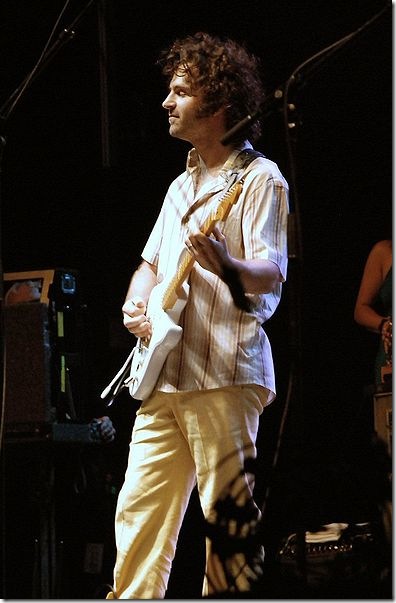Zappa Plays Zappa, guitarist Dweezil Zappa’s tribute band to his late father Frank Zappa, first appeared in South Florida on Dec. 10, 2006.
That concert at Mizner Park Ampitheatre in Boca Raton featured a circus-like atmosphere, partly due to a band that grew to 10 pieces through guest alumni from Frank’s touring units, namely vocalist/saxophonist Napoleon Murphy Brock, guitarist Steve Vai and drummer/vocalist Terry Bozzio.
On Friday night at Revolution in Fort Lauderdale, Dweezil downsized the band, eliminated the guest appearances, and delivered a much more consistent tribute.
Three years ago, for every highlight — like the energetic Brock’s torching of Zomby Woof (from the 1973 gem Over-Nite Sensation) — there was an unnecessary lowlight like Bozzio screeching I’m So Cute (from the up-and-down 1979 album Sheik Yerbouti).
This time, Dweezil brought back the core of the band (multi-instrumentalist Scheila Gonzalez, guitarist Jamie Kime, bassist Pete Griffin, drummer Joe Travers and percussionist Billy Hulting), added a dynamic new lead singer in Ben Thomas, and focused primarily on material from the 1970s, arguably Frank’s strongest decade.
The two-and-a-half-hour set opened with the instrumental The Purple Lagoon, from the 1978 release Zappa in New York. Gonzalez (on saxophone) and Zappa both made strong opening statements through their solos, with Travers and Hulting (who switched between marimba and congas) providing impeccable color and shading.
Novelty Sheik Yerbouti pieces like Broken Hearts Are for Assholes and Jones Crusher, along with Bamboozled by Love from the 1981 album Tinseltown Rebellion, all occurred early before a blazing final 90 minutes. Zappa’s choice of Road Ladies, a slow blues from the 1970 release Chunga’s Revenge, showcased his imaginative soloing, Thomas’ growling voice and impressive ensemble singing. In a rare display of vocal harmonies, all seven musicians sang during the show.
Keep It Greasey (Joe’s Garage, 1979) featured complex, stuttered rhythms by Travers, who played a shell game with the song’s meter. A force throughout the evening, he then played an unaccompanied solo on drums and a series of tuned bells. Travers is not only the archivist for the Zappa Family Trust, but has also made impressive contributions to albums by the group Z (with Dweezil and singing brother Ahmet Zappa) and Mike Keneally, the incredible guitarist, vocalist and keyboardist who was part of Frank Zappa’s final touring band.
Griffin’s bass provided a rhythmic vapor lock to the complex compositions all night, which culminated on the title track to the 1974 disc Apostrophe, on which he emulated Jack Bruce’s creativity and distortion. The Don’t Eat the Yellow Snow medley from the same album, while not exactingly replicated, made up for its instrumental imperfections through spirited ensemble vocals.
“This is our fifth straight year of touring,” Zappa said afterward, “and I’m glad to see more and more young people coming out like the ones here tonight.” The guitarist then mimicked The Knack’s My Sharona during a reading of the classic parody [i]Montana[i], and Thomas played a stellar harmonica solo and jumped into the crowd on the requested San Ber’dino (One Size Fits All, 1975).
The singer also soloed on a megaphone, muting it with his hand, on the closing Over-Nite Sensation epic Cosmik Debris, but a preceding medley stole the show. The 1974 album Roxy & Elsewhere featured perhaps Zappa’s best band and best work, and Echidna’s Arf (Of You)/Don’t You Ever Wash That Thing? finally put the soloing spotlight on Kime, along with Travers and Hulting — who provided a compelling drums-and-percussion dialog.
Zappa opened the encores with the instrumental masterpiece Peaches en Regalia (Hot Rats, 1969), then gave the crowd multiple-choice options. Willie the Pimp was elected to close the show, but the preceding choice, Muffin Man (from Bongo Fury, 1975), showcased the best of Dweezil’s solos, as he added a Frank-approved reggae section and even quoted the theme from The Twilight Zone.
The bandleader, in fact, showed newfound dexterity and maturity throughout. Though his occasional vocals still don’t have the personality of his father’s, Dweezil was able to emulate Frank’s awkward, speech pattern-derived guitar lines much more accurately than in 2006. At Revolution, the young musician proved a worthy heir to his father’s estimable legacy.
Bill Meredith is a freelance writer based in South Florida.
